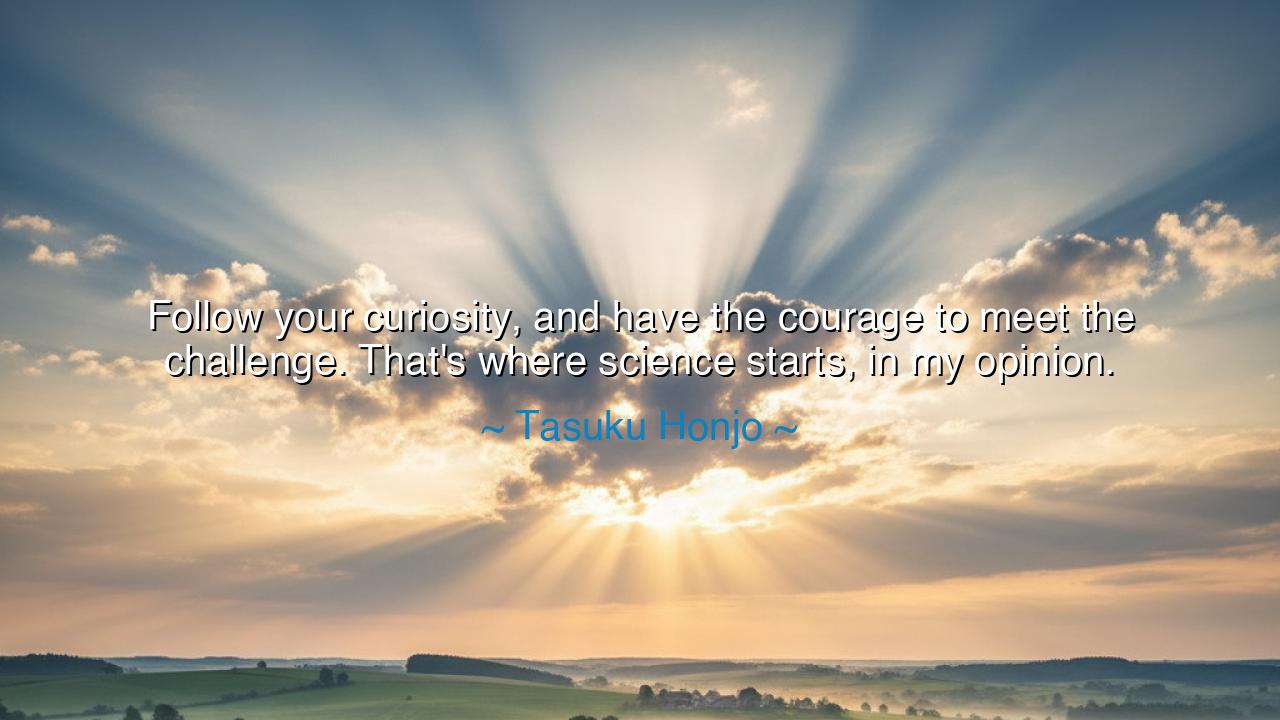
Follow your curiosity, and have the courage to meet the
Follow your curiosity, and have the courage to meet the challenge. That's where science starts, in my opinion.






Tasuku Honjo, Nobel laureate and pioneer of modern immunology, once spoke words that illuminate both the path of science and the journey of the human spirit: “Follow your curiosity, and have the courage to meet the challenge. That’s where science starts, in my opinion.” These words, though born from the mind of a scientist, echo with the wisdom of the ancients. They remind us that discovery — whether of truth, of self, or of the mysteries of the universe — begins not with certainty, but with curiosity, and is carried forward only by courage.
Honjo’s words spring from his own life’s voyage. As a young man in Japan, he was driven not by the promise of fame or wealth, but by the quiet wonder of the unknown — the yearning to understand how the body’s invisible defenses worked, how it could wage silent wars within, and how these mysteries might be harnessed to save life. His curiosity led him into long nights of study and solitude, into experiments that failed more often than they succeeded. Yet through that struggle, his courage held firm. Decades later, his discoveries in immunotherapy transformed medicine, giving humanity new weapons in its battle against cancer. His path shows that true science — like true wisdom — does not begin in power, but in wonder.
In the ancient world, the same truth was spoken in other tongues. Aristotle called curiosity “the beginning of philosophy.” Galileo, gazing at the stars through a humble telescope, defied the dogmas of his age because he dared to trust his own eyes — because his curiosity was stronger than his fear. It was courage, not comfort, that made him face the scorn of kings and priests. Thus, from Honjo to Galileo, from the laboratory to the heavens, the story of every discovery begins with the same sacred spark: the refusal to turn away from mystery.
Yet curiosity alone is not enough. The world is full of dreamers who wonder but do not dare. Courage must walk hand in hand with curiosity, for the pursuit of truth is never gentle. The path of the seeker is lined with doubt, with failure, and with misunderstanding. Honjo’s words remind us that to follow one’s curiosity is not a leisurely stroll — it is a pilgrimage through uncertainty. The scientist, the artist, the philosopher — all must confront not only the limits of knowledge but the limits of their own endurance. It is courage that allows curiosity to become creation.
History is rich with examples of this sacred union between wonder and bravery. Marie Curie, too, followed her curiosity into the unseen realm of radiation, though it exposed her to hardship and danger. Her courage did not shrink, even as her health declined; she gave her life for the light of discovery. Her story, like Honjo’s, tells us that the greatest advancements are not born of ease, but of sacrifice — that to seek truth is to risk failure, and to face that risk with an open heart.
Honjo’s statement is also a warning to all who would walk the path of knowledge: do not seek glory, seek understanding. Science begins not in ambition, but in humility — in the willingness to say, “I do not know, but I wish to learn.” Curiosity opens the door; courage carries the soul through it. The scientist must have the heart of a child and the spirit of a warrior — innocent enough to wonder, but steadfast enough to persevere. When these two forces unite, knowledge advances, and humanity rises.
So, my child of the mind and heart, take this teaching to your own life: follow your curiosity wherever it leads, even when others call it foolish. Question the world, question yourself, and do not fear the vastness of what you do not know. But when the journey grows dark — when doubt whispers that you are lost — remember that courage is the light that will guide you through. Every discovery begins as a small flame of curiosity, tended by the steady hand of courage. Nurture that flame within yourself, and it will illuminate paths not only of science, but of the soul. For in the end, as Tasuku Honjo teaches, the pursuit of knowledge is not merely the quest to understand the world — it is the quest to become fully alive.






AAdministratorAdministrator
Welcome, honored guests. Please leave a comment, we will respond soon